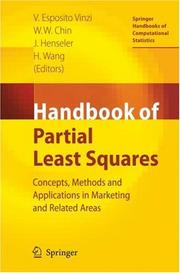| Listing 1 - 2 of 2 |
Sort by
|
Book
ISBN: 9780387767215 0387767207 9780387767208 9786612824234 0387767215 1282824236 Year: 2008 Publisher: New York : Springer,
Abstract | Keywords | Export | Availability | Bookmark
 Loading...
Loading...Choose an application
- Reference Manager
- EndNote
- RefWorks (Direct export to RefWorks)
Random effects and latent variable models are broadly used in analyses of multivariate data. These models can accommodate high dimensional data having a variety of measurement scales. Methods for model selection and comparison are needed in conducting hypothesis tests and in building sparse predictive models. However, classical methods for model comparison are not well justified in such settings. This book presents state of the art methods for accommodating model uncertainty in random effects and latent variable models. It will appeal to students, applied data analysts, and experienced researchers. The chapters are based on the contributors’ research, with mathematical details minimized using applications-motivated descriptions. The first part of the book focuses on frequentist likelihood ratio and score tests for zero variance components. Contributors include Xihong Lin, Daowen Zhang and Ciprian Crainiceanu. The second part focuses on Bayesian methods for random effects selection in linear mixed effects and generalized linear mixed models. Contributors include David Dunson and collaborators Bo Cai and Saki Kinney. The final part focuses on structural equation models, with Peter Bentler and Jiajuan Liang presenting a frequentist approach, Sik-Yum Lee and Xin-Yuan Song presenting a Bayesian approach based on path sampling, and Joyee Ghosh and David Dunson proposing a method for default prior specification and efficient posterior computation. David Dunson is Professor in the Department of Statistical Science at Duke University. He is an international authority on Bayesian methods for correlated data, a fellow of the American Statistical Association, and winner of the David Byar and Mortimer Spiegelman Awards.
Statistics. --- Statistical Theory and Methods. --- Mathematical statistics. --- Statistique --- Statistique mathématique --- Electronic books. -- local. --- Latent variables. --- Random data (Statistics). --- Latent variables --- Random data (Statistics) --- Mathematics --- Mathematical Statistics --- Physical Sciences & Mathematics --- Data, Random (Statistics) --- Constructs, Hypothetical --- Hypothetical constructs --- Variables, Latent --- Mathematics. --- Probabilities. --- Probability Theory and Stochastic Processes. --- Statistics --- Stochastic processes --- Latent structure analysis --- Multivariate analysis --- Variables (Mathematics) --- Distribution (Probability theory. --- Statistical inference --- Statistics, Mathematical --- Probabilities --- Sampling (Statistics) --- Distribution functions --- Frequency distribution --- Characteristic functions --- Statistical methods --- Statistics . --- Statistical analysis --- Statistical data --- Statistical science --- Econometrics --- Probability --- Combinations --- Chance --- Least squares --- Mathematical statistics --- Risk

ISBN: 9783540328254 9783540328278 9783540861768 9783662500439 Year: 2010 Publisher: Berlin Heidelberg Springer Berlin Heidelberg
Abstract | Keywords | Export | Availability | Bookmark
 Loading...
Loading...Choose an application
- Reference Manager
- EndNote
- RefWorks (Direct export to RefWorks)
The "Handbook of Partial Least Squares (PLS) and Marketing: Concepts, Methods and Applications" is the second volume in the series of the Handbooks of Computational Statistics. This Handbook represents a comprehensive overview of PLS methods with specific reference to their use in Marketing and with a discussion of the directions of current research and perspectives. The Handbook covers the broad area of PLS Methods from Regression to Structural Equation Modeling, from methods to applications, from software to interpretation of results. The Handbook features papers on the use and the analysis of latent variables and indicators by means of the PLS Path Modeling approach from the design of the causal network to the model assessment and improvement. Moreover, within the PLS framework, the Handbook addresses, among others, special and advanced topics such as the analysis of multi-block, multi-group and multi-structured data, the use of categorical indicators, the study of interaction effects, the integration of classification issues, the validation aspects and the comparison between the component-based PLS approach and the covariance-based Structural Equation Modeling. Most chapters comprise a thorough discussion of applications to problems from Marketing and related areas. Furthermore, a few tutorials focus on some key aspects of PLS analysis with a didactic approach. This Handbook serves as both an introduction for those without prior knowledge of PLS as well as a comprehensive reference for researchers and practitioners interested in the most recent advances in PLS methodology.
Quantitative methods in social research --- Mathematical statistics --- Least squares --- Regression analysis --- Structural equation modeling --- Path analysis (Statistics) --- Latent variables --- Marketing --- Moindres carrés --- Analyse de régression --- Variables latentes --- Data processing --- Statistical methods --- Informatique --- EPUB-LIV-FT LIVMATHE LIVSTATI SPRINGER-B --- 519.2 --- SEM (Structural equation modeling) --- Multivariate analysis --- Factor analysis --- Analysis, Path (Statistics) --- Path analysis --- Consumer goods --- Domestic marketing --- Retail marketing --- Retail trade --- Industrial management --- Aftermarkets --- Selling --- Method of least squares --- Squares, Least --- Curve fitting --- Geodesy --- Mathematics --- Probabilities --- Triangulation --- Constructs, Hypothetical --- Hypothetical constructs --- Variables, Latent --- Latent structure analysis --- Variables (Mathematics) --- 519.2 Probability. Mathematical statistics --- Probability. Mathematical statistics
| Listing 1 - 2 of 2 |
Sort by
|

 Search
Search Feedback
Feedback About UniCat
About UniCat  Help
Help News
News